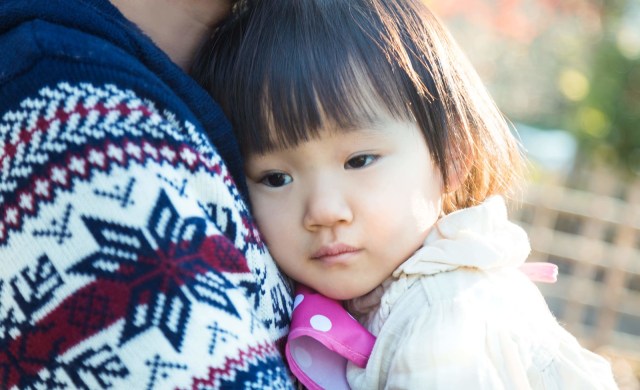
Worried by the prospect of growing distant from your daughter? According to this woman, there’s one main thing you have to keep in mind.
Parenthood is daunting at the best of times. It’s no small feat to take responsibility for a tiny baby and help them grow into a hopefully self-sufficient adult.
Many parents worry about the balance to strike with their kids between punishment and praise; you want to make sure your child grows up with strong morals and life skills, but you also want them to be happy. Ideally, you want them to love you back as much as you love them… even after they grow up.
One Twitter user overheard a conversation some new fathers were having and picked up an important nugget of advice for any fathers-to-be, and kindly shared it with the Internet in this thread.
幼い娘を持つ父親2人が、「いつまで娘と仲良くいられるか」と悩んでた時に、隣にいた女性新入社員がひと言。
— イシコ (@newsalaryman_21) October 26, 2019
「私はお母さんがお父さんを大事にしてたのを見て、私もそうなった。邪険に扱ってたら、私もそれに倣ったと思います」
世のお父さん、大事なのは娘ファーストではなく、妻ファーストです。
“Two fathers with young daughters were fretting over whether it’s really possible to stay on good terms with your daughter forever, and the new hire next to them, a woman, told them this:
‘My mom always treated my dad like he was really important to her. I think watching that behavior made me want to imitate her… If she had always treated him like a nuisance, I think I would have mimicked that instead.’
So, fathers of the world, I recommend putting your focus not on your daughter but on your wife!”
He then elaborated in a follow-up tweet:
“This opinion made a big impression on me when I heard it, but of course I’d like to hear more perspectives from the real, lived experiences of women. I wonder, does watching mothers praise fathers and treat them as valuable really result in that behavior spreading?”
He also acknowledged how some people took umbrage at his language in the first post, with its implication that the onus was on the man to treasure his wife rather than equal respect. He explained that his real opinion was that your child should be treated as a person under the couple’s care, thus the need for a united front between both partners.
The logic here is that if a girl’s father treats her mother kindly, and she is kind and supportive to him in return, the daughter will model her behavior on that of her mother resulting in a lasting, positive attitude towards her father.
Many women took him up on his request for more experiences in the replies, and also in quote-retweets such as this one:
私も、今でも父と2人でお出かけするほど仲良いけど
— msk (@msk_dot) October 28, 2019
・父が母にありがとうとごめんねを言えている
・母が父をサポートしている。
・父が娘に優しい(やりたいことの意思を否定しない等)
の3点が大事なポイントだなぁと思ってた。
優先順位も上から順で父と仲良くできる理由。 https://t.co/uN6JnvNH77
“I’m still on good enough terms with my dad that the two of us go out alone together sometimes.
– My dad always managed to say ‘thank you’ and ‘I’m sorry’ to my mom.
– My mom, in turn, always supported him.
– My dad was always kind to me, his daughter (he never shot down the things I wanted to do, etc.)
I always thought these three points were what mattered most. They’re ranked in order of importance to why I get on with my dad, from top to bottom.”
▼ Occasional disputes are fine, but constant marital strife can sour children’s opinions
More nuanced perspective were offered in the replies, with positive and negative examples:
“I think it depends on whether everyone in the family is being valued. My experience was that my mother went above and beyond for my father, to the level of risking her mental health, and my father just frittered it all away. So watching him I thought ‘this guy has no morals, I can’t respect someone like that.’ I think it’s impossible to create familial harmony when each member isn’t respected.”
“I hate my father. My mother always puts him first, but he never does the same for her. It’s plain to see that he’s a bully. Ever since I realized that, I just couldn’t bring myself to like my dad, because he didn’t treat my beloved mom like she mattered at all. Kids are always paying attention to the relationship between their parents.”
“I wouldn’t phrase it like ‘putting the focus on your wife.’ More like, it’s good for the parents to have mutual respect. My parents worked the same job, and I would always hear my mom say stuff like ‘this is all thanks to your dad’s work.’ My dad would talk about my mom’s work too. He’d say, ‘She’s really amazing at work!’ and stuff, haha. Anyway, it turned out with me respecting both of them.”
As with any anecdotal observation, there are sure to be cases where this doesn’t apply, but my experience aligns with the majority of these posters — the gender of the parents isn’t especially important, but if you see spitefulness or cruelty between your parents, then your opinion of them will suffer. Children tend to hold both parents in high esteem, and it’s only natural they would feel hurt or betrayed to see one treat the other badly.
Source: Twitter/@newsalaryman_21 via Hachima Kiko
Top image: Pakutaso
Insert image: Pakutaso
● Want to hear about SoraNews24’s latest articles as soon as they’re published? Follow us on Facebook and Twitter!


 Over 40 percent of Japanese high school girls say their dads smell bad in survey
Over 40 percent of Japanese high school girls say their dads smell bad in survey Poll asks for the top 10 times Japanese men are disappointed in their adult daughters
Poll asks for the top 10 times Japanese men are disappointed in their adult daughters Japanese family find creatives solution after “tanuki” sends daughter letter, promises play date
Japanese family find creatives solution after “tanuki” sends daughter letter, promises play date Short story from online forum gets rendered as a manga, has netizens in tears…
Short story from online forum gets rendered as a manga, has netizens in tears… Foreigner’s request for help in Tokyo makes us sad for the state of society
Foreigner’s request for help in Tokyo makes us sad for the state of society Historical figures get manga makeovers from artists of Spy x Family, My Hero Academia and more
Historical figures get manga makeovers from artists of Spy x Family, My Hero Academia and more McDonald’s new Happy Meals offer up cute and practical Sanrio lifestyle goods
McDonald’s new Happy Meals offer up cute and practical Sanrio lifestyle goods Red light district sushi restaurant in Tokyo shows us just how wrong we were about it
Red light district sushi restaurant in Tokyo shows us just how wrong we were about it Anime girl English teacher Ellen-sensei becomes VTuber/VVTUber and NFT
Anime girl English teacher Ellen-sensei becomes VTuber/VVTUber and NFT Celebrate another year of life by putting it in jeopardy with this birthday candle flower
Celebrate another year of life by putting it in jeopardy with this birthday candle flower Japan’s massive matcha parfait weighs 6 kilos, contains hidden surprises for anyone who eats it
Japan’s massive matcha parfait weighs 6 kilos, contains hidden surprises for anyone who eats it Sandwiches fit for a sumo served up in Osaka【Taste Test】
Sandwiches fit for a sumo served up in Osaka【Taste Test】 Tokyo Tsukiji fish market site to be redeveloped with 50,000-seat stadium, hotel, shopping center
Tokyo Tsukiji fish market site to be redeveloped with 50,000-seat stadium, hotel, shopping center A Gintama fan’s emotional 19-year journey to buy a proper Lake Toya bokuto wooden katana【Pics】
A Gintama fan’s emotional 19-year journey to buy a proper Lake Toya bokuto wooden katana【Pics】 Japanese ramen restaurants under pressure from new yen banknotes
Japanese ramen restaurants under pressure from new yen banknotes All-you-can-drink Starbucks and amazing views part of Tokyo’s new 170 meter-high sky lounge
All-you-can-drink Starbucks and amazing views part of Tokyo’s new 170 meter-high sky lounge French Fries Bread in Tokyo’s Shibuya becomes a hit on social media
French Fries Bread in Tokyo’s Shibuya becomes a hit on social media Studio Ghibli releases new action figures featuring Nausicaä of the Valley of the Wind characters
Studio Ghibli releases new action figures featuring Nausicaä of the Valley of the Wind characters New private rooms on Tokaido Shinkansen change the way we travel from Tokyo to Kyoto
New private rooms on Tokaido Shinkansen change the way we travel from Tokyo to Kyoto Studio Ghibli glasses cases let anime characters keep an eye on your spectacles
Studio Ghibli glasses cases let anime characters keep an eye on your spectacles Beautiful Ghibli sealing wax kits let you create accessories and elegant letter decorations【Pics】
Beautiful Ghibli sealing wax kits let you create accessories and elegant letter decorations【Pics】 Studio Ghibli releases Kiki’s Delivery Service chocolate cake pouches in Japan
Studio Ghibli releases Kiki’s Delivery Service chocolate cake pouches in Japan New definition of “Japanese whiskey” goes into effect to prevent fakes from fooling overseas buyers
New definition of “Japanese whiskey” goes into effect to prevent fakes from fooling overseas buyers Our Japanese reporter visits Costco in the U.S., finds super American and very Japanese things
Our Japanese reporter visits Costco in the U.S., finds super American and very Japanese things Studio Ghibli unveils Mother’s Day gift set that captures the love in My Neighbour Totoro
Studio Ghibli unveils Mother’s Day gift set that captures the love in My Neighbour Totoro New Japanese KitKat flavour stars Sanrio characters, including Hello Kitty
New Japanese KitKat flavour stars Sanrio characters, including Hello Kitty More foreign tourists than ever before in history visited Japan last month
More foreign tourists than ever before in history visited Japan last month New Pokémon cakes let you eat your way through Pikachu and all the Eevee evolutions
New Pokémon cakes let you eat your way through Pikachu and all the Eevee evolutions Sales of Japan’s most convenient train ticket/shopping payment cards suspended indefinitely
Sales of Japan’s most convenient train ticket/shopping payment cards suspended indefinitely Sold-out Studio Ghibli desktop humidifiers are back so Totoro can help you through the dry season
Sold-out Studio Ghibli desktop humidifiers are back so Totoro can help you through the dry season Japanese government to make first change to romanization spelling rules since the 1950s
Japanese government to make first change to romanization spelling rules since the 1950s Ghibli founders Toshio Suzuki and Hayao Miyazaki contribute to Japanese whisky Totoro label design
Ghibli founders Toshio Suzuki and Hayao Miyazaki contribute to Japanese whisky Totoro label design Doraemon found buried at sea as scene from 1993 anime becomes real life【Photos】
Doraemon found buried at sea as scene from 1993 anime becomes real life【Photos】 Tokyo’s most famous Starbucks is closed
Tokyo’s most famous Starbucks is closed One Piece characters’ nationalities revealed, but fans have mixed opinions
One Piece characters’ nationalities revealed, but fans have mixed opinions We asked a Uniqlo employee what four things we should buy and their suggestions didn’t disappoint
We asked a Uniqlo employee what four things we should buy and their suggestions didn’t disappoint Princesses, fruits, and blacksmiths: Study reveals the 30 most unusual family names in Japan
Princesses, fruits, and blacksmiths: Study reveals the 30 most unusual family names in Japan Japanese boy knows the one thing he needs when evacuating from typhoon, and it melts our hearts
Japanese boy knows the one thing he needs when evacuating from typhoon, and it melts our hearts 11 different ways to say “father” in Japanese
11 different ways to say “father” in Japanese Father arrested for taking the fall for son’s hit and run in Tokyo
Father arrested for taking the fall for son’s hit and run in Tokyo Fireman photographs female in bath, gets chased by parents, drives off with mother on bonnet
Fireman photographs female in bath, gets chased by parents, drives off with mother on bonnet Things get awkward as cosplayer’s dad learns to double-check his suitcase before business trips
Things get awkward as cosplayer’s dad learns to double-check his suitcase before business trips The pros and cons of having otaku parents, according to Japanese anime fans
The pros and cons of having otaku parents, according to Japanese anime fans Three-year-old Japanese girl loves Grand Theft Auto, dad says it’s a great game for kids
Three-year-old Japanese girl loves Grand Theft Auto, dad says it’s a great game for kids Father “pays” son for helping with yard work, what he earns is not what you might expect!
Father “pays” son for helping with yard work, what he earns is not what you might expect! Japanese sixth-grader calls out smartphone-loving parents over anti-video game lectures
Japanese sixth-grader calls out smartphone-loving parents over anti-video game lectures Japanese Twitter revels in the wholesome, blurry hilarity of this daughter’s photo of her dad
Japanese Twitter revels in the wholesome, blurry hilarity of this daughter’s photo of her dad Japanese fathers lack appreciation on Father’s Day, urged to celebrate it for themselves
Japanese fathers lack appreciation on Father’s Day, urged to celebrate it for themselves Japanese dads reveal the shocking secret behind their daughters’ “homemade” Valentine’s chocolate
Japanese dads reveal the shocking secret behind their daughters’ “homemade” Valentine’s chocolate “My father was arrested”—Student’s award-winning essay tells the story of a crime in her family
“My father was arrested”—Student’s award-winning essay tells the story of a crime in her family New father dresses like iconic pop culture characters and takes baths with his kid
New father dresses like iconic pop culture characters and takes baths with his kid
Leave a Reply